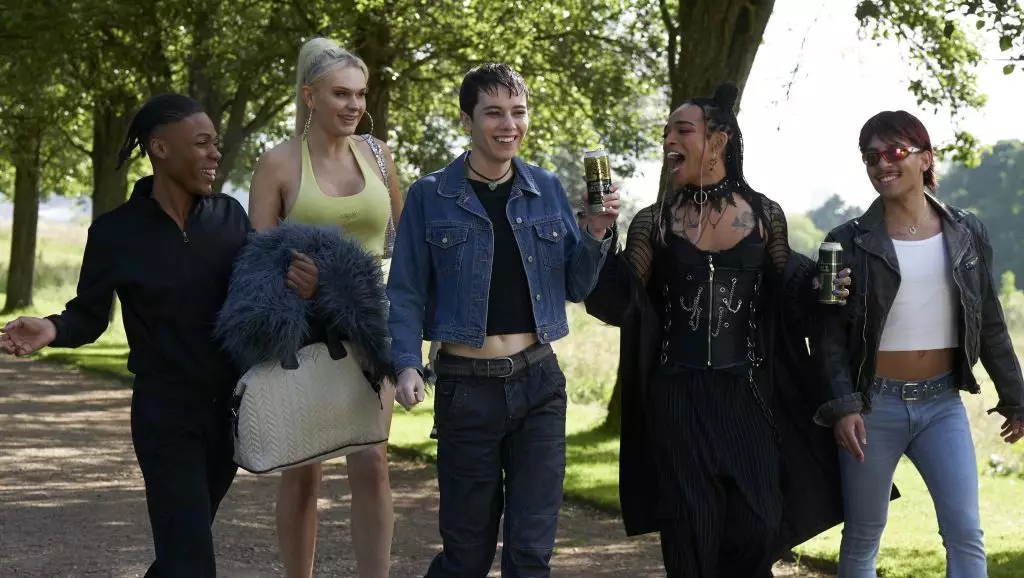The upcoming BBC3 series, “What It Feels Like For A Girl,” promises to be a captivating exploration of identity, rebellion, and the tumultuous journey that many young people face in their quest for self-discovery. Adapted from the memoir of Paris Lees, a trailblazing transgender activist and writer, this eight-part series aims not just to narrate a coming-of-age story but also to encapsulate the spirit of an era—the early 2000s—when the music scene and social acceptance were in a state of chaotic transformation.
The casting of Ellis Howard as Byron, a young boy transitioning into womanhood, is a masterstroke. Lees herself acknowledges Howard’s unique blend of characteristics, including a “cheekiness” and “delicateness,” which are crucial for portraying the multifaceted aspects of a character that stands at the precipice of gender identity and societal expectation. The casting director’s choice reflects a larger trend in the entertainment industry, emphasizing authenticity and representation—the need for performers who can embody the stories they are telling.
A Wild Ride Through Nottingham’s Underworld
The narrative plunges Byron into Nottingham’s vibrant nightlife, positioning him amongst a motley crew of characters dubbed “The Fallen Divas.” This collective serves as a metaphor for the diversity and challenges encountered within LGBT communities during that era. Each character appears to embody a different facet of liberation and chaos, inviting viewers to reflect on their connections and disputes.
The series’ logline vividly paints a picture of hedonism intertwined with camaraderie: “Between them, they beg, steal and skank their way on a rollercoaster ride.” It does well to highlight the thrill and dangers of seeking belonging in such a world. There is a rawness to the characters, especially with the fierce rivalry between Byron and Sasha, a relationship that promises not only tension but an exploration of complex female friendships amidst the backdrop of competition.
The Production Spectrum
Notably, the involvement of seasoned professionals in both writing and directing roles assures potential viewers of a high-quality production. With Brian Welsh, known for his work on “Black Mirror,” leading as the director, the show is likely to delve into visual storytelling that transcends mere narrative. The collaborative writing process, including contributions from Lees herself, promises authenticity, ensuring that the depicted experiences resonate with genuine lived reality.
Supporting cast members like Laura Haddock and Michael Socha further enhance the series’ depth, each bringing their unique talents to this elaborate tapestry of youth culture and LGBTQ+ experiences. Their involvement signifies a larger movement in television towards engaging diverse narratives and ensuring that marginalized voices are represented in significant roles.
Exploring Themes of Identity and Acceptance
At its core, “What It Feels Like For A Girl” travels beyond ambient celebration of nightlife and youth to delve into difficult themes surrounding gender identity, acceptance, and the pitfalls of hedonism. As Byron grapples with acceptance and identity within a community that often demanding conformity, the narrative challenges viewers to confront their own understandings of masculinity and femininity.
This series addresses an urgent need for more portrayals of trans lives that capture the rich, conflicting experiences many face. As the climate for conversations surrounding gender fluidity and non-binary identities grows, the show’s timing could not be more opportune. Rather than merely providing representation, it encourages engagement with the associated complexities and emotional landscapes.
A Transformative Experience for Audiences
As the first images of the production are unveiled alongside details of a promising cast, excitement builds around “What It Feels Like For A Girl.” The fresh energy of a new generation of storytelling is palpable, driven by the unique vision of Lees and her collaborators. This adaptation has the potential to challenge myths surrounding transgender narratives, illuminating realities often overshadowed by sensationalism.
In an age where stories are used as powerful tools for change, this series positions itself not just as entertainment but as an invitation for dialogue. Will it shake the foundations of conventional storytelling around gender and identity? Only time will tell, but it is certainly positioned to ignite important conversations that extend beyond the screen, making it a series to watch.

